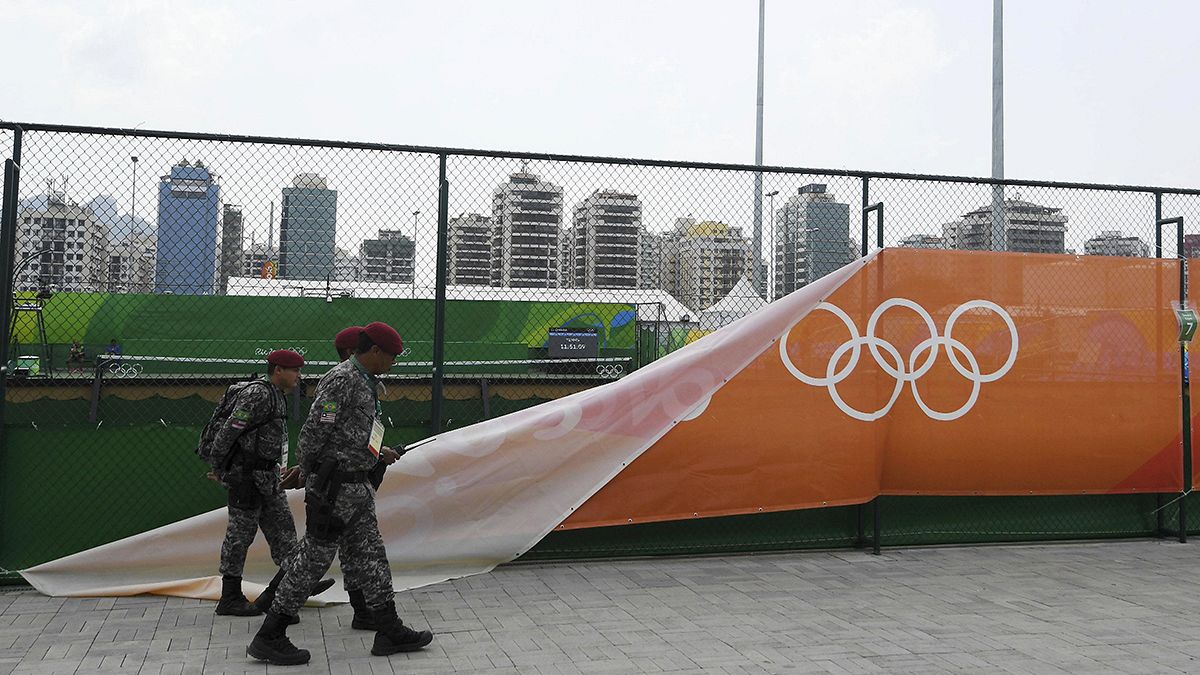Rio Olympic organisers continued to be plagued with problems as strong winds, a knife-point robbery of a foreign government official and fresh doping scandals on Sunday threatened to derail the smooth running of the world’s largest multi-sport event.
Wind gusts across the Brazilian city on the second full day of competition forced the cancellation of the rowing events and delayed the start times of tennis and kayaking, while fans on the Copacabana beach fled from flying deckchairs and toppling parasols.
At the beach volleyball arena, construction workers could be seen tightening screws halfway up the metal scaffolding and removing flags on the southern side of the spectator seating area to prevent them from being blown away.
Games officials, already having to grapple with complaints of long lines at security checkpoints and having to detonate suspicious items on the coastline as precautionary measures, also faced new security issues.
Although extra soldiers were deployed around the equestrian venue after an unexplained stray bullet tore through the plastic walls of the press centre, it emerged around midday that Portugal’s education minister had been robbed in broad daylight.
The incident also comes after the bizarre incident where a photographer found himself standing behind a thief wearing his stolen Olympic photo bib, trying to gain access to the Sambodromo archery venue without a credential, which in itself is a major security breach.
Brazilian authorities later confirmed the minister was unharmed and the thieves in both cases arrested.
On Wednesday, three Swedish tourists were briefly kidnapped by armed men after they stopped to take photographs near a favela. Rio gangs do not allow photographs where they operate for fear of being identified by police. The Swedish trio were released without incident.
More Doping Scandals
While the sports events were temporarily put on hold by the stormy weather, additional doping allegations have cast a shadow over both the Olympic and Paralympic Games in Rio.
On Friday, British newspaper The Sunday Times reported that Kenya’s track and field team manager, expected to lead his team at the Olympic opening ceremony, was secretly filmed offering to protect cheating athletes from the drug-testing authorities.
Major Michael Rotich, who was ordered last night to return to Kenya to stand trial for misconduct, had allegedly offered to provide advance warning of drugs tests to athletes in return for a £10,000 bribe during an undercover investigation.
Then on Sunday morning, the International Paralympic Committee (IPC) announced it had imposed a blanket ban on Russia after dozens of its athletes had been implicated in the damming McLaren report which detailed widespread, state-sponsored doping in the country.
“The IPC governing board has suspended the Russian Paralympic Committee with immediate effect,” IPC president Phillip Craven told reporters at a press conference. “The anti-doping system in Russia is broken, corrupted and completely compromised.”
“I believe the Russian government has catastrophically failed its para-athletes. Their ‘medals over morals’ mentality disgusts me, “ he added.
While the International Olympic Committee (IOC) had left the decision to ban Russian athletes to individual sports federations – a move which drew heavy criticism from anti-doping agencies – the IPC seemed unfazed when it came to suspending the nation from its own Games.
Craven said he had “deep sympathy” for the athletes unable to compete, but maintained the decision was taken in the best interests of the Paralympic Movement.
Russian sports minister Vitaly Mutko immediately said the IPC ruling would be appealed to the Court of Arbitration for Sport.
In addition, the governing body World Archery has since released a statement condemning the IPC’s decision, saying it went against “the principles of inclusion fair play.”
Although para-sport is not widely followed in Russia, in part due to what campaigners say is a result of regressive social attitudes to disability, the country is one of the most successful nations in the world.
Russia topped the medal table at the 2014 Sochi Paralympics and finished second behind China at the 2012 London Paralympics. They had also planned to send 267 athletes to the 2016 Rio Games.
